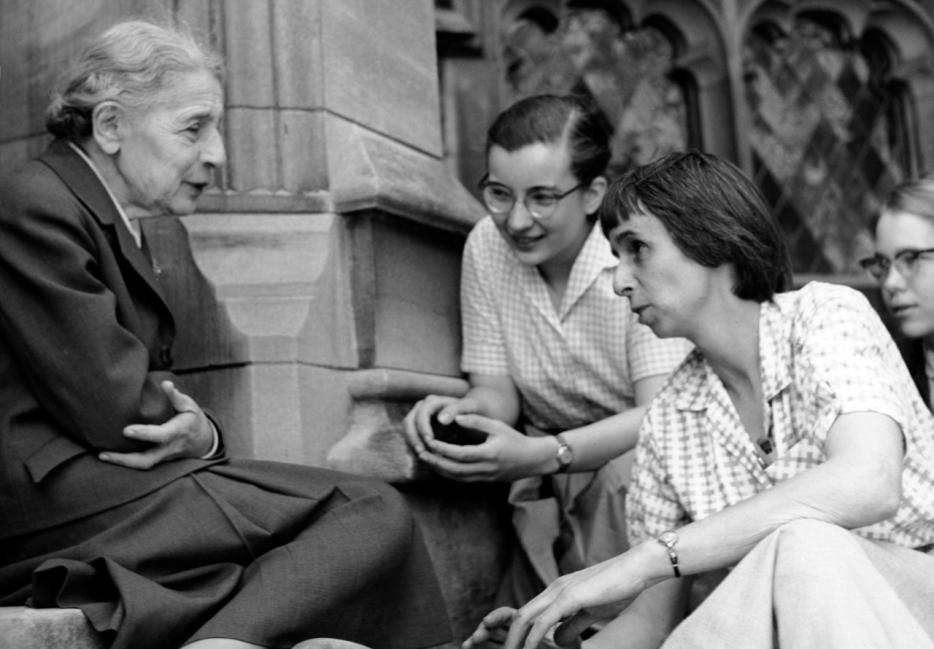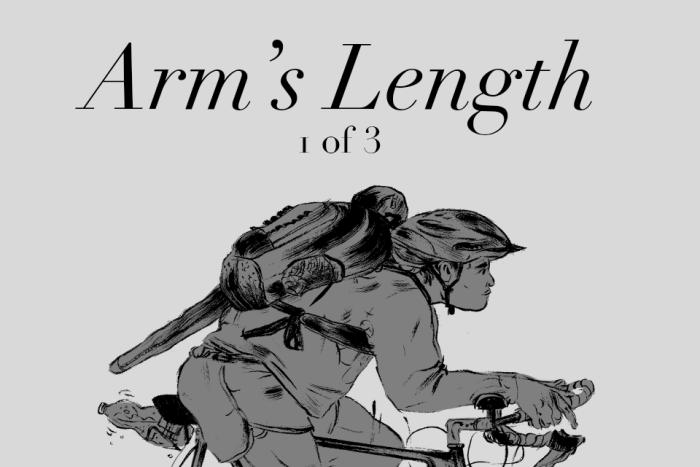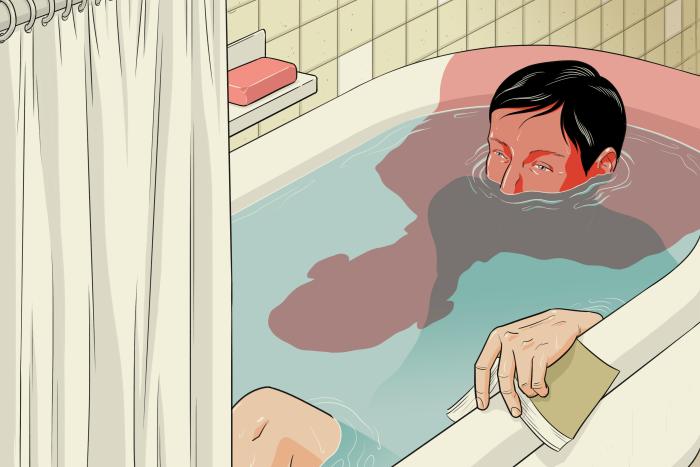In 1993, Margaret Rossiter coined a term for the forgotten women in science and, more generally, academia: The Matilda Effect. There was a pattern throughout history, she argued, of women who, when compared to men, failed to receive equal recognition or reputation for equal scientific achievement. These are the women whose names have been relegated to footnotes, or whose accomplishments have been scrubbed out like a blemish. “Not only have those unrecognized in their own time generally remained so,” Rossiter wrote, “but others that were well-known in their day have since been obliterated from history.” To look back at historic record, we might think that women hardly made any contribution to science at all—but that’s not the case.
Take one 11th century Italian physician named Trotula who gained both fame and respect in her own lifetime for treating women’s ailments. By the next century, a historian assumed someone so accomplished couldn’t be a woman and changed her pronoun and name to the masculine form. In the 20th century, her gender was reversed, but her occupation morphed to midwife. Textbooks abound with scientific discoveries that are credited to men, even when a woman is a co-discoverer or, more grievously, when she has made the first breakthrough.
The pile-up of omissions is at its most stark when it comes to the Nobel Prize. Marie Curie won two, but history, apparently, allows only a few women to shine—particularly when they aren’t married to their co-collaborators. Frieda Robscheit-Robbins worked with pathologist George Hoyt Whipple for nearly three decades and they co-authored most of their published papers. Yet it was Whipple, not Robscheit-Robbins, who took home the Nobel Prize in 1934 (he did, however, share his prize money with her). In 1962, crystallographer Rosalind Franklin’s discoveries earned her collaborators—a word Rossiter stressed barely applies—the Nobel. Franklin was deceased by then and her team inflated their contributions, building fame and accomplishment with a tool kit of white lies.
These were not isolated cases. In the 1950s, C.S. Wu watched her team win the Nobel, as did astrophysicist Jocelyn Bell and pharmacologist Candace Pert in the ’60s and ’70s. In 1985, Isabella Karle saw her husband and his German co-author win the Nobel for work she had been collaborating with him on for nearly half a century. Rossiter argued that the “most notorious theft of Nobel credit,” however, was that of Otto Hahn in 1944. He worked for decades with Lise Meitner studying nuclear fission, but he alone received credit. Hahn didn’t see the big deal. “I really had no responsibility for the course events had taken,” he complained in his autobiography. Besides, he said, Women’s National Press Club had declared Meitner “Woman of the Year” in the U.S.—what did she have to complain about? Was that not good enough?
In the end, Rossiter decided to name her theory after Matilda Joslyn Gage, a feminist and suffragist who was one of the first to openly contemplate the forgotten women effect. Gage came of age in the mid-1800s and, as an outspoken daughter of a famous abolitionist, experienced the same gender ousting of her namesake. In response, she banded together a group of women and wrote the Woman’s Bible, a feminist reinterpretation of what is, perhaps, the world’s oldest sausage fest. As dynamic as she was, Gage didn’t escape the Matilda Effect. In describing Gage’s modern obscurity, feminist writer Dale Spender wrote: “Unable to use her ideas, patriarchy has elected to lose them. It is as if she had not existed.” Spender called it not just a theft of women’s accomplishments, but their very being.
*
It’s winter 2015 and I’m at a media industry event, safely ensconced in a circle of small talk. I feel the man’s hand land on my left arm before I see him. He has a butterfly light touch, but we don’t know each other and his easy intimacy with my body gives his palm the weight of a dead slug. He leans in closer, not to introduce himself, but to speak to the man next to me. I study his face, and it doesn’t feel like staring: he’s close enough to mark me as a lover—or, perhaps, a chair. I’m wearing heels and he’s shorter than me, leaning in, tipping at an acute angle, leading with his nose. His wrinkled face is flushed Valentine pink and I can tell he has a penchant for turtlenecks and also sounding smart. Minutes tick by while he persists in saying nothing to me. Still, his hand rests there, a casual hey-you invasion that sends chills like squirming maggots, stings hot like a bee swarm.
The world’s historians have systematically snuffed out hundreds of women, their accomplishments, their bravery and even their notoriety all smudged into the smoky past.
Then finally, he does turn to me. His eyes are like saucers with their inquisition, magnified by the lenses of his ridiculous glasses. He wants to know why I’m here, at this upper ranks industry event. It’s clear from his questions that he’s mistaken me for a tagalong, an intern at the magazine I edit (as if that would give him the right). He’s fixated on my apparent youth. This man hurls the phrase “you’re young” like a javelin. In my mind, I go Godzilla. But on the outside, my politeness and rage have made me civil. I slip into a familiar mode: watching myself speak with self-deprecating smiles, cringing at the dance that has me receding and him regaining every inch. And, still his hand has not moved. I wager with myself—okay, if it lasts one minute more—but he leaves as abruptly as he arrives, engulfed in the crowd, his palm and five fingers a brand on my arm.
It’s not the first time I’ve done this. This grin-and-bear-it game. This disappearing act.
*
I’ve grown obsessed with finding the women history forgot. I spend hours scouring feminist blogs, Tumblr cascades that rewrite our skewed history. Books make towers in my living room. I even watch a cheesy Netflix documentary series hosted by Xena’s Lucy Lawless called Warrior Women. I know I’m not alone. In March, American-Canadian feminist Anita Sarkeesian, creator of the web series and non-profit Feminist Frequency, launched a crowdfunding campaign for her new video project Ordinary Women. “Rather than heroes, leaders and innovators,” wrote Sarkeesian, “women are often depicted and treated as secondary characters in history, objects of affections, damsels to be rescued, or merely the wives, mothers and assistants to the men who achieved important things.” The series will explore the lives of five women who “defied gender stereotypes and changed the world.”
Five is a drop in the bucket. If she wanted to, Sarkeesian could keep her series going into old age. The world’s historians have systematically snuffed out hundreds of women, their accomplishments, their bravery and even their notoriety all smudged into the smoky past. When we do cheer these women, it’s usually those grand “firsts”—the first woman doctor, the first woman lawyer, the first woman Olympian. We’ve turned them into lone wolves, anomalies. We’ve satisfied ourselves with the myth that the first is the only and, darnit, that’s good enough. But let’s be honest: those firsts are often overlooked, too. Collectively, we’ve failed to make a habit of celebrating women through history. Or perhaps, we just don’t know very much about them at all.
A man in a bad suit, now an emperor of bodies.
That’s not an accident. Many historians deliberately washed these women’s names and deeds from the official records—their hands guided by distaste, disgust, dismissiveness, or a combination of all three. Consider Ireland’s pirate queen Grace O’Malley. While she’s since gleaned a speck of fame, she was, as one history magazine put it, “ignored by contemporary chroniclers.” They deemed her “a woman who hath imprudently passed the part of womanhood.” There is no mention of her in the country’s famous and lengthy tomes of history, The Annals of the Kingdom of Ireland, even though she routed the English from Irish waters and met Queen Elizabeth twice. For centuries, she didn’t exist. Much of what is known about her comes from her own surviving correspondence, or Irish state papers. She is more legend than woman.
At least she is that: other women are completely erased. Sometimes, I imagine them all linked together into a faceless paper-doll chain. I wonder if I am one of them. Together, we could stretch to the moon.
*
I’m a guest speaker at a university. On the way here, the professor whose class this is explained to me the varied definitions of sexual assault. He’s outraged that a hand on an arm is now grounds for a report. Spit rains from his fleshy mouth; his elastic lips move over his words like earthworms. Of course, he’s laid his hand on my arm to demonstrate. He’s tall and his hand feels huge, even though he’s old and, I think, frail. You wouldn’t know it now. He’s grown imperious—a man in a bad suit, now an emperor of bodies. You could call his ring of balding hair the crown. Can you believe, he asks me, that you could call this harassment? Yes, I think. My mind turns the word into a looping siren. Yes-yes-yes-yes-yes. We’re trapped in a car, a rust bucket that’s become his grand hall, his public court.
He tells me about a pretty student.
He asks if I’m on Tinder.
He says, Too bad you are divorced. Are you dating anyone?
I contemplate taking a stuntwoman’s leap into the zooming highway asphalt.
After class, I field missed emails and he says good talk and then rubs the spot between my shoulder blades in lazy circles. My entire body clenches, and I twitch forward like I’m ready to vomit. His touch has given me the sudden flu, a high school hangover, the bubonic plague. We drive back to my office and I get out of the car blocks and blocks early. My entire body is hot, but alone on the street I can breathe again.
*
Of all the forgotten women, the shroud is wrapped especially tight around “Miss G.” We don’t even know her real name. We do know Edward H. Clarke wrote about her in his 1873 book Sex in Education: A Fair Chance for Girls. The name of the book is misleading, though, because Clarke appeared to have scant interest in helping women. In fact, he seemed more invested in exposing the folly of educating them. Clarke recorded that Miss G. gained admission to a western college—presumably a newly co-ed one—and thereafter died. He drew an explicit connection between the two. “While pursuing these studies, while doing all this work,” he wrote, “she steadily ignored her woman’s make.” He went on to argue that while girls and women may technically be capable of higher learning, it went against the “laws of nature.” In others words, intellectual learning could kill a woman.
He blamed this both on women’s reproductive systems and their menstrual cycle—what he called “rhythmical periodicity.” Young men, quite obviously, don’t have to worry about such things and, therefore, he argued, are free to dedicate all their bodily effort into learning. Clarke believed the body was, as one critical feminist academic put it, “a closed energy system.” Meaning, if the body undertook one effort—like a woman’s period—it would divert significantly from another—the rigours of academic learning. That’s why women’s bodies, Clarke believed, prevented them from fully participating in the same academic and professional pursuits as men (albeit unfairly). It sounds laughably anachronistic. Well. Except for the many ways in which women today are shut out from similar endeavours. Except for the fact that not much has changed but the language. Except for.
The statistics are, by now, appallingly common. The technology field is, perhaps, most often discussed—and the numbers are bad. In 2015, only 13 percent of Twitter’s tech staff was composed of women. At LinkedIn, that number is 17 percent; at Facebook it’s 16 percent; at Google it’s 18 percent; at Pinterest, it’s 21 percent. In academia, men out earn women. In the U.S., women hold lower academic positions, are far less likely to be on the tenure track, and far more likely to face advancement challenges if they have children—despite earning PhD parity with men in 2002. Actually, beyond careers and industries that typically fall into the “female” binary, women’s representation isn’t great anywhere (and, it’s even less so if you’re not a white, straight woman).
Even fictional worlds suck. In February 2016, the Institute for Diversity and Empowerment at Annenberg University released a paper that showed our entertainment—and the industry that produces it—is just as dismal. Of the 11,306 speaking characters in U.S.-produced film and TV roles in 2014-2015, just over 30 percent were women. Men carried most ensemble casts, and the numbers were even grimmer among women of colour and those on the LGBTQ spectrum. Unsurprisingly, given all this, there were also very few women behind the camera. Only 15 percent of all directors were women (and only 3.4 percent of film directors); less than 30 percent of screenwriters were women; and women made up just over 20 percent of show creators. Black women directed only two of the projects. On the executive level, women’s representation decreased as role power increased.
“Stereotypes about women are prescriptive as well as descriptive,” opens one study on the ways in which men and women are praised differently in office settings. It went on to show that women are expected to be office helpers—staying late, arranging the office cupcakes, cleaning the kitchens—and are, therefore, not rewarded when they do so. Men, on the other hand, are exalted as over-and-above employees when they help out in the same ways. To rub salt in that proverbial wound, men who do nothing in the office are evaluated and congratulated as much as women who do everything. To repeat: women have to do more to be viewed as equals with men who do less. The researchers concluded that stereotypes were, essentially, cutting women off at the knees. They could neither overcome them, nor fail to preform them—both produced punishing effects.
Sometimes, I imagine what Miss G. looked like. I give her chestnut hair, and a perpetual smirk, intelligent eyes. For some reason, I always conjure a bonnet. Mostly, I pretend she didn’t die the way Clarke claimed. I make believe that he used her as a straw construct, produced endless edits on her reality that turned her into someone else. Someone who wasn’t her, who wasn’t any woman. I’m so certain I’m right when I guess that he hollowed her out into a stereotype to prove a point—to make the first or the thousandth snowflake in the that’s-the-way-women-are avalanche that threatens to bury us all any day, or maybe already has. I imagine that she didn’t die reading a book, because we should all know that’s absurd, but instead lived into old age. That her skin became a raisin.
Or maybe she didn’t exist at all.
That’s possible, too.
*
I’m here to meet the writer-in-residence. My skirt is splashed with watermelons. His personality is doused in pomposity. His eyes surf up and down my outfit and I tell myself I’m imagining things. But then he smirks, nice skirt. I say thank-you, but he won’t be dissuaded. It has watermelons on it. I agree. I mean, that’s a thing I know already because it’s been in my closet for years, plus I chose to put it on this morning. That’s quite the outfit you have going on there today. I smile as a defence. I put politeness on like armor. A small, primal part of me wants to poke my pen through his eye. The whole thing really. Our appointment is 20 minutes and I’ve spent five of them trying to get him to move on to a topic more interesting than my skirt. My fucking skirt. I press my knees together, focus on pushing hard enough to connect bone through flesh.
It’s just us in this room and I tell myself I asked for this meeting.
Before I have a chance to say much at all, he decides who I am. He decides I will be more confident once I have published something in a magazine. (Reality: I’ve won several awards for my long-form magazine writing.) He decides I will be more confident once I’ve given more media interviews. (Reality: I’ve been a guest on CBC’s Q more than once, done TV, local radio a dozen or more times.) He decides I am not confident. (Reality: not exactly, in this moment.) He decides I need someone to show me the ropes. (Reality: I can’t even.) He decides I am young and inexperienced and cute. (Reality: Ugh.)
He decides.
He decides.
He decides.
My vocabulary is reduced to bursts of “but, actually.” He declares the meeting over once he runs out of monologue and I wonder at the new person he’s created for me. Will he smugly tell his friends he helped a newbie today? Will he remember this encounter at all, or will it fizz out, disappear like carbon from soda turned flat? I leave not understanding, but in my mouth something lingers that’s just as tasteless.
Later on, I can’t explain why I didn’t correct him. I shrug inexplicably to a chorus of dismay: “But why didn’t you tell him?” Then, with a sick and giddy feeling that I’ve failed, I Google him again. For the hundredth time. I see again what I already know: a few years ago he won the same prestigious award that I did weeks prior to meeting him.
You could almost say we’re equals.






